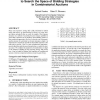119 search results - page 23 / 24 » The complexity of pure Nash equilibria |
ICS
2010
Tsinghua U.
14 years 7 months ago
2010
Tsinghua U.
: Many natural games can have a dramatic difference between the quality of their best and worst Nash equilibria, even in pure strategies. Yet, nearly all work to date on dynamics s...
NETWORKING
2008
13 years 11 months ago
2008
We study distributed content replication networks formed voluntarily by selfish autonomous users, seeking access to information objects that originate from distant servers. Each us...
GECCO
2005
Springer
14 years 3 months ago
2005
Springer
Many non-cooperative settings that could potentially be studied using game theory are characterized by having very large strategy spaces and payoffs that are costly to compute. Be...
IPTPS
2004
Springer
14 years 3 months ago
2004
Springer
In P2P systems, users often have many choices of peers from whom to download their data. Each user cares primarily about its own response time, which depends on how many other use...
ATAL
2007
Springer
14 years 4 months ago
2007
Springer
Agents engaged in noncooperative interaction may seek to achieve a Nash equilibrium; this requires that agents be aware of others’ rewards. Misinformation about rewards leads to...

